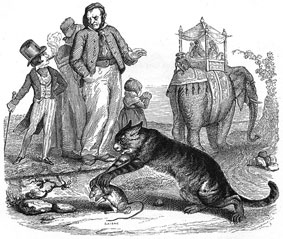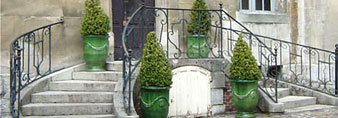THE OBSEQUIES OF THE LIONESS(VIII,14)
The lion's consort died, and lay in state ;
When straight came flocking all the great,
To show their grief before the king,
And compliments of sad condolence bring,
Which give a deeper shade to woe.
The monarch let the county know
The day of her interment, and the place,
Saying his provosts should be there,
To rank the mourners with becoming grace.
They all came to the funeral pomp with care ;
The king gave up himself to roaring then,
The sounds re-echoed on his gloomy den.
The lions have no other temple.
His courtiers follow his example,
And in their brogue howled anthems to the air.
I paint the court a country, where
The people laugh or mourn with equal ease,
Ready for everything their prince may please ;
Or if they can't in heart, they show good-will ;
Chameleons all, they ape their master still.
His soul in their ten thousand bodies lives,
And motion to the human clock-work gives.
But to the subject let us keep.—
The stag was gay—alas ! how could he weep ?
This death revenged him—for, a short time gone,
The queen had strangled both his wife and son !
In fine, he wept not—while a spy ran in,
And swore before the king he saw him grin.
Dreadful is kingly wrath, as says the sage ;
More dreadful yet king lion in a rage !
But our poor stag had never read a page.
The king addressed him " Woodman, so you're gay,
And laugh while these their loudest grief display.
We will not on your body so profane
Defile our sacred claws.—Ho wolves, come here,
And let the wretch an offering be slain,
Who scorns to give the royal shade a tear ! "
"Sire," cried the stag, " the time of grief is sped ;
Your worthy half sleeps on a flowery bed :
Hard by this spot to me she did appear ;
I recognised her starting from my sleep‑
Dear stag,’ she said, ‘0 list ! O list ! 0 list!
Let nothing at my funeral make thee weep ;
For then I quit my grove so blessed,
And from Elysian sweets remove,
To live and talk with fellow-saints above :
But let the king show grief profound,
Which for a season I approve.' "
Hardly they heard him when they cried :
" A miracle ! She's deified ! "
The stag was pardoned, and with presents crowned.
With dreams amuse the king, and blind his eyes,
Flatter his ears, and tell him pleasing lies ;
Whatever rage his swelling breast may rend,
He'll bite the bait, and make that foe a friend. |
THE RAT AND ELEPHANT (VIII, 15)
Our own importance to enhance
Is quite the common style in France,
Although one be an arrant cit.
The French disease ! why, this is it.
This silly vanity is all our own.
The pride of Spaniards is indeed well known,
But he's more of a madman than a zany :
Here is our own profile, as good as any.
A little rat an elephant beheld,
Of greatest bulk—and the slow motion railed
Of him that such great family showed,
Who travelled with a ponderous load.
Upon the beast, three stories tall,
A famed sultana sat,
Her parrot, monkey, dog, and cat,
Her servant and her household all,
On pilgrimage.—The rat expressed surprise,
To see the moving mass make people stare,
As if the space of ground we occupied,
And more or less of that our share,
Should sink or raise our merit in their eyes.
" But, mortals, why admire him so," he cried,
" Because the lubber frightens children home !
Little although we are, yet we maintain
Our rank with elephants, nor yield a grain."
He had gone on so boldly vain,
But quick there chanced the cat to come,
Which in a moment made him grant,
A rat was not an elephant. |

illustr. J.J. Grandville |
|
THE HOROSCOPE (VIII, 16)
Men meet their fate, and oft to ruin run,
In taking roads that very fate to shun.
A sire who loved his only son,
To fortune-tellers went to know
The history of hie fortune here below.
One told him, till a certain age
To guard the child against the lion's rage,
Till aged twenty, and no more..
The father, who believed his lore,
To this precaution carefully attended,
On which the life of his dear boy depended;
Ordered him ne'er to pass the palace gate.
He gave him all he wished, but going out ;
Companions every day, with hearts elate,
To walk, to jump, or race about.
But riper years brought new desires,
And hunting now his mind inspires.
That sport they painted him as base ;
But vain our efforts in such case,
Lessons, counsels, admonitions
Nothing changes dispositions.
The youth, unhappy, ardent, void of fears,
Could not restrain the transport of his years :
The darker they the danger drew,
The stronger his ambition grew.
He knew the cause of this forbidden game ;
Though fatal, he desired it all the same
The palace with magnificence abounded,
And pictures every where his eyes surrounded.
Landscapes the pencil on the canvas traced;
And on the tapestry the huntsmen chased.
In some the varions animals were seen;
In others personages on the green.
The youth, at last enraged, a lion spied
" Ah ! monster, 'tis for you," he cried,
" That cloistered here I'm doomed in chains to grow ! "
His indignation boiled within his breast.
With hardy fist he struck the pictured beast ;
A nail behind received the blow,
Which wrung his heart, and worked his woe,
Whom Esculapius could not save
The cares for his existence proved his grave.
To Eschylus like warning was a snare
One of those dreamers told him to beware,
Or that a house would fall upon bis head,
When straight he fled the town, and took his bed
Upon the field in open air.
An eagle with a tortoise hovered there,
Who saw the poet's head so bald and bare ;
He took it for a snowy lump of rock,
Let fali his prey thereon to get it broke‑
And Eschylus no more awoke !
Thus it appears
This art, if true, will make us fall
Into our fears,
But I maintain it is not true at all
For neither nature's hands nor ours are bound
To snob extent, that on the azure round
Our fates are writ ; our lot depends
On times and places, foes and friends,
And not on fortune-teller's chatter.
Shepherd and monarch have one star alike,
One bears the crown, and one the clod must strike.
" Thus Jupiter by the dread Styx
Decrees " a senseless matter !
How cornes it then his influence
Can such unequal fates dispense ?
How cornes it here at all ? how could it fare
Through vast illimitable fields of air ?
Fly past the sun, and stars to sight denied,
A mote might turn that influence aside.
When has astrology that mote descried ?
Some student sure of that deep art
The present state of Europe must have seen
Full long ago—why did he not impart
His knowledge, if such knowledge e'er had been ?
The distance wide, the point, its speed,
That of our passions too,
Will all allow their little power indeed
To follow all our acts : can it be true
Our lot depends on that whose course
Wanders like ours ? and yet by force
This silly folk, with chalk and line,
Would fain mark out your life and mine!
But these too doubtful points that I relate
Of Eschylus and that poor darling's doom,
One in the field, the other in his room,
Must not decide. False is the art, and dark ;
One arrow in a thousand hits the mark‑
By fate sometimes their chance agrees with fate. |
|



